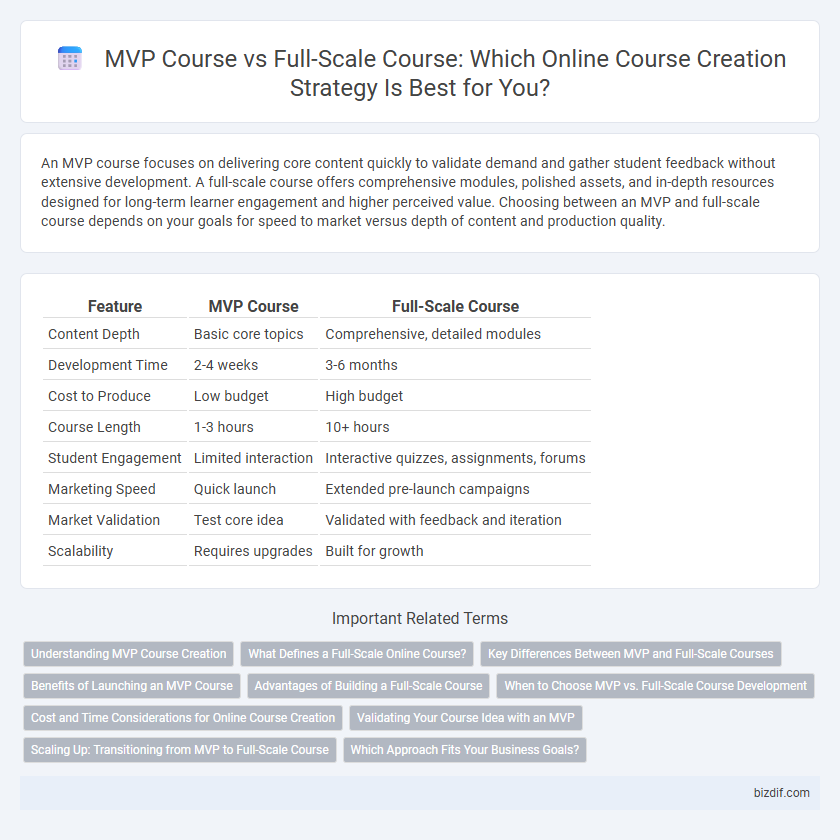An MVP course focuses on delivering core content quickly to validate demand and gather student feedback without extensive development. A full-scale course offers comprehensive modules, polished assets, and in-depth resources designed for long-term learner engagement and higher perceived value. Choosing between an MVP and full-scale course depends on your goals for speed to market versus depth of content and production quality.
Table of Comparison
| Feature | MVP Course | Full-Scale Course |
|---|---|---|
| Content Depth | Basic core topics | Comprehensive, detailed modules |
| Development Time | 2-4 weeks | 3-6 months |
| Cost to Produce | Low budget | High budget |
| Course Length | 1-3 hours | 10+ hours |
| Student Engagement | Limited interaction | Interactive quizzes, assignments, forums |
| Marketing Speed | Quick launch | Extended pre-launch campaigns |
| Market Validation | Test core idea | Validated with feedback and iteration |
| Scalability | Requires upgrades | Built for growth |
Understanding MVP Course Creation
An MVP course in online course creation focuses on delivering core content that addresses key student pain points with minimal resources, allowing rapid validation of the course concept. This approach emphasizes essential modules and practical exercises to gather early feedback and iterate effectively. Developing an MVP course minimizes initial investment risks while building a foundation for a more comprehensive full-scale course.
What Defines a Full-Scale Online Course?
A full-scale online course is defined by comprehensive content that covers the subject matter in depth, including a blend of video lectures, quizzes, assignments, and interactive elements designed to enhance learning outcomes. It incorporates advanced features such as personalized feedback, community forums, and progress tracking to support student engagement and retention. Unlike an MVP course, a full-scale course offers a polished user experience with extensive resources and supplementary materials to provide a complete educational journey.
Key Differences Between MVP and Full-Scale Courses
An MVP course focuses on delivering core content quickly with minimal features to validate market demand and gather early feedback, while a full-scale course offers comprehensive modules, advanced resources, and polished multimedia elements designed for long-term engagement. MVP courses prioritize speed and cost-efficiency, often featuring limited interactivity and basic assessments, whereas full-scale courses incorporate detailed lesson plans, interactive assignments, and extensive learner support. Key differences include development time, content depth, user experience sophistication, and overall investment in production quality.
Benefits of Launching an MVP Course
Launching an MVP course allows creators to quickly validate their course idea with minimal investment, gathering real user feedback to refine content and structure. This approach reduces risk by testing market demand before committing significant resources to a full-scale course. Early engagement helps identify essential topics and learner preferences, ensuring the final product meets audience needs effectively.
Advantages of Building a Full-Scale Course
Building a full-scale course offers comprehensive content coverage, enhancing learner engagement and satisfaction by addressing diverse knowledge levels and learning styles. It establishes credibility and authority in the niche, thereby attracting a broader audience and increasing course sales potential. A full-scale course also enables scalable updates and supplementary materials, fostering long-term customer loyalty and continuous revenue streams.
When to Choose MVP vs. Full-Scale Course Development
Choosing an MVP course is ideal when testing market demand quickly and gathering student feedback with minimal investment, allowing for agile improvements. Opt for full-scale course development when the target audience is well-defined, and comprehensive content creation supports a strong brand reputation and long-term learner engagement. Analyzing resource availability, budget constraints, and strategic goals helps determine the optimal course development approach.
Cost and Time Considerations for Online Course Creation
Developing an MVP course significantly reduces initial costs and production time compared to a full-scale course, as it focuses on delivering core content with minimal resources. Full-scale courses require extensive investment in multimedia production, comprehensive curriculum development, and thorough quality assurance, which increases both budget and time commitments. Prioritizing an MVP approach enables faster market entry and iterative improvements based on learner feedback, optimizing resource allocation during online course creation.
Validating Your Course Idea with an MVP
Launching an MVP course allows educators to validate their course idea quickly by testing core content with a smaller audience and gathering real user feedback. This approach reduces initial development time and costs while identifying essential topics that resonate most with learners. Data collected from the MVP phase drives informed decisions to expand into a full-scale course that meets market demands effectively.
Scaling Up: Transitioning from MVP to Full-Scale Course
Scaling up from an MVP course to a full-scale course involves expanding content depth, integrating advanced multimedia elements, and incorporating comprehensive assessments to enhance learner engagement and retention. This transition requires optimizing course architecture for scalability, implementing robust learner support systems, and leveraging analytics to refine content effectiveness. Effective scaling also demands strategic marketing and ongoing updates to maintain course relevance and competitive positioning in the e-learning market.
Which Approach Fits Your Business Goals?
Choosing between an MVP course and a full-scale course depends on your business goals and resource availability. MVP courses allow you to test market demand quickly with minimal content, reducing upfront investment and enabling faster feedback collection. Full-scale courses offer comprehensive content and polished delivery, ideal for established brands seeking to provide in-depth learning experiences and maximize long-term revenue.
MVP course vs Full-scale course Infographic

 bizdif.com
bizdif.com